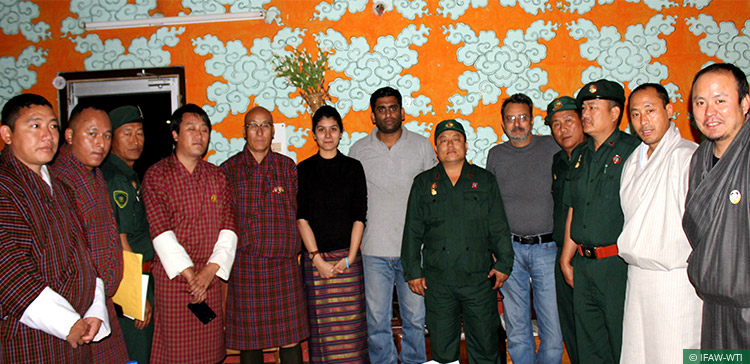 Trainers and trainees during the CDR analysis training workshop in Gelephu, Bhutan
Trainers and trainees during the CDR analysis training workshop in Gelephu, Bhutan
Gelephu, Bhutan, February 13, 2017: As part of the ongoing efforts to train, equip and boost the morale of forest department personnel in Bhutan, the International Fund for Animal Welfare (IFAW) and Wildlife Trust of India (WTI), in partnership with the Government of Bhutan’s Department of Forests and Park Services (DoFPS), conducted a two-day technical workshop on Call Data Records (CDR) analysis for a select group of enforcement officials on February 2 and 3. This was the first training exercise of this nature for wildlife officials in Bhutan.
The use of CDR – which involves the analysis of cellular tower data in a specified set of locations to shrink/expand a suspect pool as needed, or track a suspect’s movements – as an investigative tool is fairly recent in India and Bhutan, and even more nascent in the investigation of wildlife crimes. It has already provided spectacular results in some instances though: in 2015 India’s Wildlife Crime Control Bureau, working with forest department officials in the southern state of Kerala, had with WTI’s assistance used CDR software developed by Mumbai-based Ketan Computers to generate leads in a poaching case in the state. What began as a single elephant poaching incident was revealed to be a complex web of interstate poachers, traders and carvers involved in the ivory trade, and culminated in the seizure of 538 kilograms of ivory in New Delhi six months later.
The technical workshop at Gelephu aimed to build the capacity of forest officers in the use of CDR analysis software in ongoing and future wildlife crime investigations. The participants had the opportunity to conduct a real-time CDR analysis using data from the aforementioned elephant poaching case from Kerala.
“This workshop is part of IFAW-WTI’s continuing efforts to help Bhutan’s DoFPS in the capacity building of its personnel”, said Jose Louies, Head, Enforcement Assistance and Law, WTI. “Our aim with such training events is to develop the investigative proficiency of wildlife enforcement officials using a modern, technical and systematic approach.”